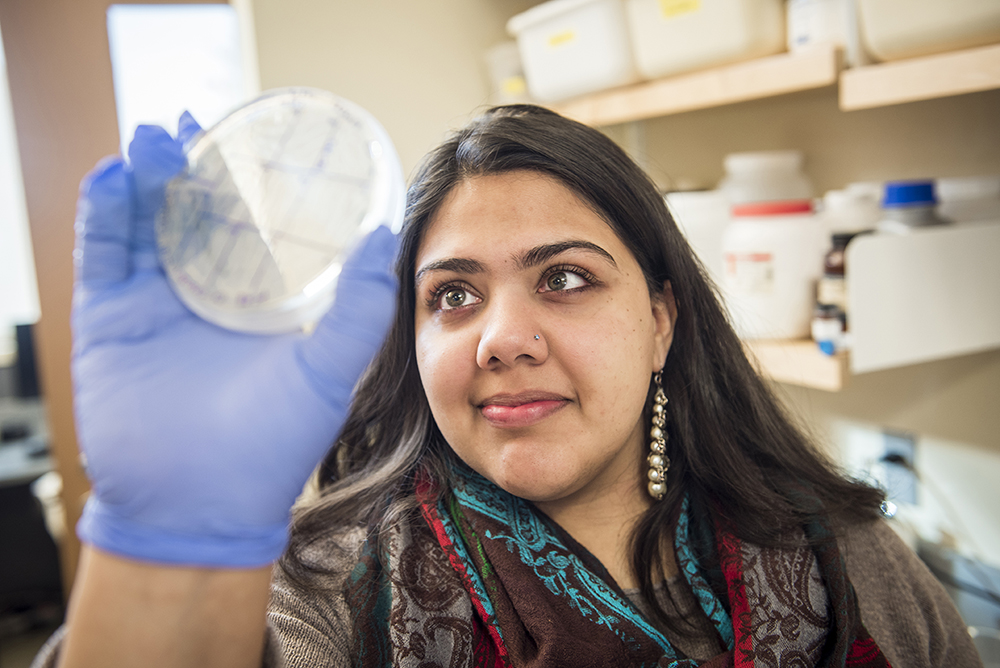Clark graduates launch careers in Massachusetts – the country’s No. 1 job market

Newly graduated Clark University students are well-positioned to find jobs in one of the best job markets in the country: Massachusetts. The Bay State recently landed yet another top ranking when the personal finance website WalletHub proclaimed Massachusetts No. 1 on its Best States to Find a Job list.
Massachusetts has “an education system that is superior to most in the country and prepares people for those jobs — and a huge healthcare sector that generates so many jobs,” Anna Tavis, professor of human capital management at New York University, told Bloomberg.
The WalletHub ranking followed a U.S. News & World Report list that cited Massachusetts one of the Top 10 Best States to Find a Job. Massachusetts’ jobless rate stands at around 3 percent.
What does this mean for Clark students? They have numerous options for gaining experience through internships, research, volunteer work and other opportunities during the school year in Worcester, Boston and beyond. And if they choose to remain in Massachusetts once they graduate, they’ll find a healthy job market.
Take Jesús Robles Garcia ’19, who is putting his double-major in computer science and economics and minor in management to work. He grew up in Swampscott, Mass., and while a student at Clark, landed an internship at State Street, a financial services and bank holding company in Boston. They offered him a job right out of school. He’s now working at State Street as an application developer/senior associate.
Or Samantha Hughson ’19, of Bothell, Washington. The computer science major and math minor interned at Amazon in Boston last summer. She found a job before she graduated, returning to Boston to work as a software engineer for TripAdvisor.
Or Arnab Banik ’19, of Dhaka, Bangladesh. He interned as a systems administrator for Clark’s Information Technology Services and graduated with a double major in physics and computer science. He’s now working in Beverly, Mass., as a robotics automation and support engineer at HighRes Biosolutions, which builds innovative robotic systems and laboratory devices used by pharmaceutical and biotech companies and academic research laboratories.
Massachusetts: a biotech hub that generates jobs
And speaking of biotech, Massachusetts is one of the largest biotech hubs in the world, rivaling California’s Bay Area. Here, Clark students who major in biology, chemistry, biochemistry and molecular biology, and other STEM majors are finding many work opportunities.
One of them, Diana Argiles Castillo ’18, M.S. ’19, of Alajuela, Costa Rica, just graduated from Clark’s Accelerated B.A./Master’s Program in Biochemistry and Molecular Biology. Prompted by her beloved grandfather’s cancer diagnosis when she was in middle school, Argiles Castillo started down the path of researching diseases and treatments.
“I was captivated by the work scientists do to create treatments, technology, and medications to help with cancer and other diseases, and was also very interested in learning how the human body works,” she recalls.
That interest eventually led her to Clark, where she gained skills and experience working with Professor Donald Spratt on protein research funded by the U.S. National Institutes of Health.
Argiles Castillo’s Clark experience paid off. In July, she begins a job as a research associate for the Dana-Farber Cancer Institute in Boston.
She follows on the heels of numerous Clark students who have begun their careers in Massachusetts’ biotech hub, often working alongside alumni.

Two years ago, Christie Joyce ’16, M.S. ’17, a biology major and chemistry minor, attended a networking event at Corbus Pharmaceuticals, founded by Dr. Mark A. Tepper ’79. They kept in touch, and soon after finishing Clark’s fifth-year Accelerated B.A./M.S. Program in Biology, Joyce started working at Corbus as a clinical trial associate.
“We’re fortunate that Clark turns out so many talented young scientists like Christie who are well-trained and offer fresh ideas and passion to Massachusetts’ growing biotech industry,” says Tepper, president and chief scientific officer of the Norwood, Mass., company, which the Boston Business Journal called “the top-performing public biotech in Massachusetts.”
On that note, Professor Spratt teaches LEEPing into a Science Career to help Clark science majors successfully navigate the job market.
Taking a cue from Clark’s undergraduate curriculum, Liberal Arts and Effective Practice (LEEP), the course features talks by alumni and other guest speakers, ranging from the president of a technology company to a pharmaceutical sales representative to a headhunter identifying job candidates for STEM employers. Among their topics: networking, setting up informational interviews, writing cover letters and résumés, identifying potential jobs, tackling job interviews, and negotiating salaries and benefits. (Read “10 tips for landing a job in the sciences.”)
Jobs in the arts, humanities and social sciences
Clark’s STEM students, however, are not the only ones finding success in Massachusetts’ booming job market. Although many recent graduates in the arts, humanities, and social sciences are heading off to prestigious graduate schools, including Clark’s Accelerated B.A./Master’s Program, others are launching their careers here with employers such as:
- McLean Hospital in Belmont
- University of Massachusetts Medical School in Worcester
- Girls Inc. of Worcester
- Solutions for Living in Stoneham
- Sovos Compliance in Wilmington
- Metro Housing Boston
- Nexamp in Boston
- Autism Behavioral Center in Berlin
- Grassroots Campaigns in Boston
- Center for Applied Behavioral Instruction in Worcester
- Massachusetts Department of Conservation and Recreation
Students draw upon Clark career resources
And which career resources did students tap into at Clark? Check out the list:
- ClarkCONNECT, which brings together students, alumni, and career-oriented communities for networking, mentoring and other opportunities.
- Handshake, a career services platform that connect students and employers, and highlights events and opportunities.
- Career Development Center, which offers undergraduate students a wide range of services.
- Advising and Support Services, ranging from the Academic Advising Center to the Office of Multicultural and First Generation Student Support.
- Clark University on LinkedIn, which is a great way to connect with alumni.


